Tag Archives: Washington Fish and Wildlife Commission
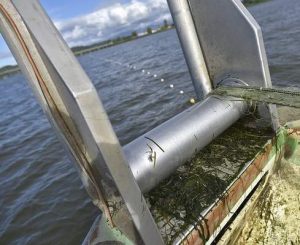
A major policy change – Washington State will allow gillnets in lower Columbia this fall
The Washington Fish and Wildlife Commission has agreed to allow the use of gillnets during the fall salmon fishery on the lower Columbia River while state fishery managers work with their Oregon counterparts to develop a joint, long-term policy for shared waters. The move is a major change in policy. Washington policy, approved in 2013, intended for the commercial fishery to have completed a transition from gillnets to alternative gear this year and be relocated away from mainstem Columbia River areas. However, the use of alternative gear has not yet been refined and the off-channel areas have been determined to be unsuitable. >click to read<10:05
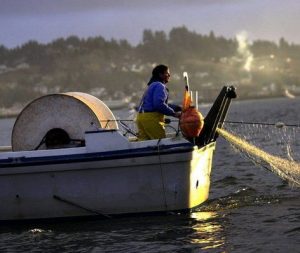
In major reversal, WA agrees to gillnets on Columbia in 2019
The Washington Fish and Wildlife Commission agreed last week to allow the use of gillnets during the fall salmon fishery on the Lower Columbia River while state fishery managers work with Oregon counterparts to develop a joint long-term policy for shared waters. The commission, appointed by the governor to set policy for the Washington Department of Fish and Wildlife, took that action and received public comments on proposed hunting seasons for 2019-21 during a public meeting March 1-2 in Spokane. The commission’s action to extend the use of gillnets was one of a number of recommendations for Columbia River fisheries developed by a joint committee with members of the Oregon Fish and Wildlife Commission. Oregon’s full commission will also consider the recommendations when it meets later this month. >click to read<Reposted from yesterday 15:53
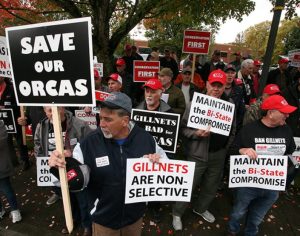
Feud over gill nets boils again
The Washington Fish and Wildlife Commission held a series of meetings at the Heathman Lodge in Vancouver from Thursday through Saturday to receive a report from state staff on the Columbia River Basin Salmon Management Policy C-3620, and review the results of that policy. During the Thursday meeting the WDWC was joined by the Oregon Fish and Wildlife Commission. While the commissions heard the report and reviewed possible options for the future of the policy, members of the Coastal Conservation Association (CCA) gathered outside the lodge to protest the prospect of the commission’s abandoning the policy entirely, which is one option being considered. >click to read<11:34
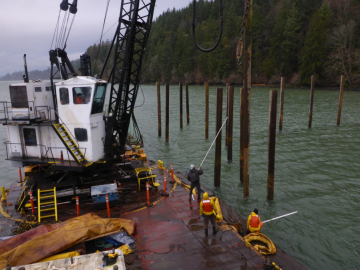
Current fishery situation is not sustainable – Kent Martin
I feel compelled to comment on the article in the Eagle (12/21/17) from the Columbia Basin Bulletin, “Group Tests Fish Trap above Cathlamet.” I attended the Wild Fish Conservancy presentation to the Washington Fish and Wildlife Commission and noted several inaccuracies, and the CBB added a few more. 1. Fish traps were never the “massive” harvest technology on the Columbia. They were outlawed in 1936 in Washington and 1948 in Oregon because many, if not most, were vertically integrated with the fish packers, and were being used to manipulate fish prices. I confronted one of the Wild Fish Conservancy people on this, and he admitted this was the case.,,, click here to read the story 10:43
Editorial: Fishermen should look for smart ways to survive
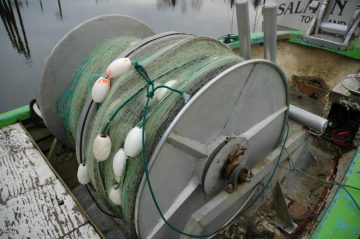 As spring Chinook salmon congregate in the ocean around the mouth of the Columbia River in anticipation of their ancient migration to upriver spawning grounds, this spring also sees a swirling conglomeration of politics in Oregon and Washington state over how to allocate salmon among different interests. In some ways nothing new, in other respects the fight over salmon is rising to a higher pitch. Increasingly involving elected leaders, the outcome is becoming even less predictable. Also unclear is where a majority of Oregon and Washington state voters stand on the issue. The key point of recent news in the matter is the Oregon Fish and Wildlife Commission’s unanimous vote to curtail gillnet fish harvests, altering an earlier decision that was more favorable to commercial fishermen. Bullied into the decision by Gov. Kate Brown, the commission backed away from its earlier acknowledgment that the states have so far failed to keep a promise made by the Oregon Legislature to ensure the continuing economic viability of the commercial fleet. Alternative fishing methods have proven ineffective, alternative fishing grounds are in short supply, and money has been slow to arrive to aid transition away from the decades long gillnetting tradition. continue reading the op-ed here 16:20
As spring Chinook salmon congregate in the ocean around the mouth of the Columbia River in anticipation of their ancient migration to upriver spawning grounds, this spring also sees a swirling conglomeration of politics in Oregon and Washington state over how to allocate salmon among different interests. In some ways nothing new, in other respects the fight over salmon is rising to a higher pitch. Increasingly involving elected leaders, the outcome is becoming even less predictable. Also unclear is where a majority of Oregon and Washington state voters stand on the issue. The key point of recent news in the matter is the Oregon Fish and Wildlife Commission’s unanimous vote to curtail gillnet fish harvests, altering an earlier decision that was more favorable to commercial fishermen. Bullied into the decision by Gov. Kate Brown, the commission backed away from its earlier acknowledgment that the states have so far failed to keep a promise made by the Oregon Legislature to ensure the continuing economic viability of the commercial fleet. Alternative fishing methods have proven ineffective, alternative fishing grounds are in short supply, and money has been slow to arrive to aid transition away from the decades long gillnetting tradition. continue reading the op-ed here 16:20
Washington to negotiate on Columbia River salmon reforms
 With time running short to adopt 2017 fishing seasons, the Washington Fish and Wildlife Commission on Friday delegated authority to director Jim Unsworth to negotiate the differences with Oregon regarding the controversial Columbia River salmon reforms. The Washington commission also intends to write a letter to its Oregon counterparts proposing a face-to-face meeting and to ask about Oregon’s commitment to shifting commercial fishing in the fall in the lower Columbia away from gillnets to gear allowing release of wild fish.,, In January, Washington modified its policy to allow for two more years of gillnetting between Woodland and Beacon Rock. Also in January, Oregon’s commission adopted rules much more friendly to commercial fishing. Oregon Gov. Kate Brown then scolded her commission and told it to adopt rules closer to those adopted by Washington. Read the article here 11:20
With time running short to adopt 2017 fishing seasons, the Washington Fish and Wildlife Commission on Friday delegated authority to director Jim Unsworth to negotiate the differences with Oregon regarding the controversial Columbia River salmon reforms. The Washington commission also intends to write a letter to its Oregon counterparts proposing a face-to-face meeting and to ask about Oregon’s commitment to shifting commercial fishing in the fall in the lower Columbia away from gillnets to gear allowing release of wild fish.,, In January, Washington modified its policy to allow for two more years of gillnetting between Woodland and Beacon Rock. Also in January, Oregon’s commission adopted rules much more friendly to commercial fishing. Oregon Gov. Kate Brown then scolded her commission and told it to adopt rules closer to those adopted by Washington. Read the article here 11:20
Oregon adopts Columbia River salmon reforms
 Oregon’s Fish and Wildlife Commission took another try Friday at adopting Columbia River salmon management reforms, but it’s still unclear if the policies will satisfy Washington’s commission. In January, the Oregon commission adopted revised reforms which were more friendly to gillnet fishermen. Following a backlash from sportsmen, Oregon Gov. Kate Brown sent the Oregon commission a scolding letter that directed the panel adopt a position closer to the details adopted in 2013 and more akin to Washington’s position. Oregon commission member Greg Wolley of Portland said he got a call from Brown on Thursday. The proposal adopted on Friday meets the spirit of her letter and the compromise Brown wanted, Wolley said. Brad Smith, chairman of the Washington Fish and Wildlife Commission, sent a letter to Michael Finley, his Oregon counterpart, on Wednesday indicating that Washington felt the plan it adopted in January already was a compromise from the original 2012 agreement. “I’m really uncomfortable with this,’’ said Oregon commission member Holly Akenson of Enterprise, who added the plan does not do enough for commercial fishermen. Read the story here 09:09
Oregon’s Fish and Wildlife Commission took another try Friday at adopting Columbia River salmon management reforms, but it’s still unclear if the policies will satisfy Washington’s commission. In January, the Oregon commission adopted revised reforms which were more friendly to gillnet fishermen. Following a backlash from sportsmen, Oregon Gov. Kate Brown sent the Oregon commission a scolding letter that directed the panel adopt a position closer to the details adopted in 2013 and more akin to Washington’s position. Oregon commission member Greg Wolley of Portland said he got a call from Brown on Thursday. The proposal adopted on Friday meets the spirit of her letter and the compromise Brown wanted, Wolley said. Brad Smith, chairman of the Washington Fish and Wildlife Commission, sent a letter to Michael Finley, his Oregon counterpart, on Wednesday indicating that Washington felt the plan it adopted in January already was a compromise from the original 2012 agreement. “I’m really uncomfortable with this,’’ said Oregon commission member Holly Akenson of Enterprise, who added the plan does not do enough for commercial fishermen. Read the story here 09:09
Oregon seeks compromise on Columbia salmon fishing reforms
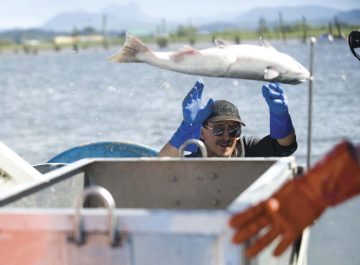 The chairman of the Oregon Fish and Wildlife Commission has offered to compromise with the Washington commission over their differences regarding the Columbia River salmon reforms. Earlier this year, the two state commissions approved reforms starting this year in how salmon are allocated between sport and commercial fishermen and allowable commercial fishing methods. Oregon opted for a plan more friendly to commercial fishing than did the Washington Fish and Wildlife Commission. Oregon Gov. Kate Brown then scolded the Oregon commission for reneging on a 2013 agreement to limit gillnetting to off-channel areas and told it to change the policy by April 3. Michael Finley, chair of the Oregon commission, sent a letter to Brad Smith, chair of the Washington commission, on Tuesday detailing his compromise proposals. By species, here is a look at Finley’s proposals: continue reading the story here 09:26
The chairman of the Oregon Fish and Wildlife Commission has offered to compromise with the Washington commission over their differences regarding the Columbia River salmon reforms. Earlier this year, the two state commissions approved reforms starting this year in how salmon are allocated between sport and commercial fishermen and allowable commercial fishing methods. Oregon opted for a plan more friendly to commercial fishing than did the Washington Fish and Wildlife Commission. Oregon Gov. Kate Brown then scolded the Oregon commission for reneging on a 2013 agreement to limit gillnetting to off-channel areas and told it to change the policy by April 3. Michael Finley, chair of the Oregon commission, sent a letter to Brad Smith, chair of the Washington commission, on Tuesday detailing his compromise proposals. By species, here is a look at Finley’s proposals: continue reading the story here 09:26
Oregon will defy joint fish management on the lower Columbia River
 The Oregon Fish and Wildlife Commission ripped a hole Friday in the 99-year-old fabric of concurrent fish management on the Columbia River. With a split 4-3 vote, commission members defied the Washington Fish and Wildlife Commission’s attempt to negotiate the long-contested Columbia River Management Plan. The plan required a switch from gill-netting to selective commercial fishing on the mainstem below Bonneville Dam. It also gave priority allocation of mainstem salmon harvest to sport anglers. Friday’s vote, however, indefinitely extends gill-netting for fall chinook salmon from Sauvie Island to Bonneville Dam and for summer chinook in the entire lower river. Read the story here 07:28
The Oregon Fish and Wildlife Commission ripped a hole Friday in the 99-year-old fabric of concurrent fish management on the Columbia River. With a split 4-3 vote, commission members defied the Washington Fish and Wildlife Commission’s attempt to negotiate the long-contested Columbia River Management Plan. The plan required a switch from gill-netting to selective commercial fishing on the mainstem below Bonneville Dam. It also gave priority allocation of mainstem salmon harvest to sport anglers. Friday’s vote, however, indefinitely extends gill-netting for fall chinook salmon from Sauvie Island to Bonneville Dam and for summer chinook in the entire lower river. Read the story here 07:28
Washington adopts Columbia River salmon fishing reforms
 The Washington Fish and Wildlife Commission agreed here Saturday to implement in 2017 the most sweeping lower Columbia River salmon fishing reforms in decades, including the elimination of gillnets in the main stem of the river during spring and summer. By a 7-2 vote, the commission decided to go ahead with implementation this year of reforms first adopted in early 2013 and phased in during a four-year transition period. Oregon’s Fish and Wildlife Commission will address the issue Friday, and there are indications it might not agree with Washington’s position. In a nutshell, the reforms allocate more chinook salmon to sportsmen in the main Columbia and restrict gillnetting to off-channel sites like Youngs Bay, Tongue Point and Blind Slough near Astoria. The reforms also call for any commercial fishing that remains in the main lower Columbia to be done with live-capture methods — such as purse seines and beach seines — designed to harvest hatchery stocks and release wild fish. Read the story here 08:14
The Washington Fish and Wildlife Commission agreed here Saturday to implement in 2017 the most sweeping lower Columbia River salmon fishing reforms in decades, including the elimination of gillnets in the main stem of the river during spring and summer. By a 7-2 vote, the commission decided to go ahead with implementation this year of reforms first adopted in early 2013 and phased in during a four-year transition period. Oregon’s Fish and Wildlife Commission will address the issue Friday, and there are indications it might not agree with Washington’s position. In a nutshell, the reforms allocate more chinook salmon to sportsmen in the main Columbia and restrict gillnetting to off-channel sites like Youngs Bay, Tongue Point and Blind Slough near Astoria. The reforms also call for any commercial fishing that remains in the main lower Columbia to be done with live-capture methods — such as purse seines and beach seines — designed to harvest hatchery stocks and release wild fish. Read the story here 08:14
Thirty-six Washington Lawmakers back Columbia River salmon reforms
 Thirty-six Washington lawmakers have signed on to a letter urging the state Fish and Wildlife Commission to push ahead in January with full implementation of the bistate Columbia River salmon reforms. Reforms adopted by Washington and Oregon in early 2013 allocated more chinook salmon to sportsmen in the main Columbia and restricted gillnetting to off-channel sites like Youngs Bay near Astoria. The reforms also called for commercial fishing that remained in the main Columbia to be done with live-capture methods — such as purse seines and beach seines — designed to harvest hatchery stocks and release wild fish.” Oregon is proposing to undo the plan based on a desire to significantly increase commercial gillnet fishing industry profits, rather than ensuring the viability of the commercial fishing industry as defined in the bistate agreement,’’ according to the letter. Read the story here 16:56
Thirty-six Washington lawmakers have signed on to a letter urging the state Fish and Wildlife Commission to push ahead in January with full implementation of the bistate Columbia River salmon reforms. Reforms adopted by Washington and Oregon in early 2013 allocated more chinook salmon to sportsmen in the main Columbia and restricted gillnetting to off-channel sites like Youngs Bay near Astoria. The reforms also called for commercial fishing that remained in the main Columbia to be done with live-capture methods — such as purse seines and beach seines — designed to harvest hatchery stocks and release wild fish.” Oregon is proposing to undo the plan based on a desire to significantly increase commercial gillnet fishing industry profits, rather than ensuring the viability of the commercial fishing industry as defined in the bistate agreement,’’ according to the letter. Read the story here 16:56
California court case could disrupt WDFW Wild Future Initiative
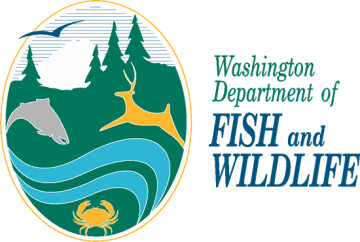 A decision made in a California court case may change the trajectory of a Washington Department of Fish and Wildlife initiative that would raise fees for resident commercial fishers and lower the fees for non-residents. Last December the U.S. 9th District Court of Appeals determined that California’s nonresident fee differential for numerous commercial fishing permits, licenses and vessel registration was constitutional. A group of out of state fishers challenged California differentiating between resident and non-resident fishers under the Privileges and Immunities Clause and the Equal Protection Clause of the U.S. Constitution. So what does the decision mean in Washington State? Well, the California lawsuit was the premise for the WDFW Wild Future initiative, which would essentially not differentiate fees for resident and non-resident commercial fishers, something the WDFW has called “equalizing the fees.” Read the article here 20:47
A decision made in a California court case may change the trajectory of a Washington Department of Fish and Wildlife initiative that would raise fees for resident commercial fishers and lower the fees for non-residents. Last December the U.S. 9th District Court of Appeals determined that California’s nonresident fee differential for numerous commercial fishing permits, licenses and vessel registration was constitutional. A group of out of state fishers challenged California differentiating between resident and non-resident fishers under the Privileges and Immunities Clause and the Equal Protection Clause of the U.S. Constitution. So what does the decision mean in Washington State? Well, the California lawsuit was the premise for the WDFW Wild Future initiative, which would essentially not differentiate fees for resident and non-resident commercial fishers, something the WDFW has called “equalizing the fees.” Read the article here 20:47
Sportsmen, commercials feud over Columbia River reforms
 Sport fishermen from Southwest Washington repeatedly exhorted the state Fish and Wildlife Commission on Saturday to implement fully in 2017 the most sweeping reforms in Columbia River salmon management in decades. And their commercial foes, also from Southwest Washington, were equally strident that the plan adopted four years ago to eliminate gillnetting from the main river and to prioritize angling has been fraught with problems in the 2013-16 transition period. The nine-member citizen panel will meet Jan. 13 and 14 in Vancouver to make its decision. The Oregon Fish and Wildlife Commission is going through similar deliberations, then the two states will need to reconcile any differences in their policies. Reforms adopted by both states in early 2013 allocated more chinook salmon to sportsmen in the main Columbia and restricted gillnetting to off-channel sites like Youngs Bay near Astoria. The reforms also called for commercial fishing that remained in the main Columbia to be done with live-capture methods — such as purse seines and beach seines — designed to harvest hatchery stocks and release wild fish. Read the rest here 08:20
Sport fishermen from Southwest Washington repeatedly exhorted the state Fish and Wildlife Commission on Saturday to implement fully in 2017 the most sweeping reforms in Columbia River salmon management in decades. And their commercial foes, also from Southwest Washington, were equally strident that the plan adopted four years ago to eliminate gillnetting from the main river and to prioritize angling has been fraught with problems in the 2013-16 transition period. The nine-member citizen panel will meet Jan. 13 and 14 in Vancouver to make its decision. The Oregon Fish and Wildlife Commission is going through similar deliberations, then the two states will need to reconcile any differences in their policies. Reforms adopted by both states in early 2013 allocated more chinook salmon to sportsmen in the main Columbia and restricted gillnetting to off-channel sites like Youngs Bay near Astoria. The reforms also called for commercial fishing that remained in the main Columbia to be done with live-capture methods — such as purse seines and beach seines — designed to harvest hatchery stocks and release wild fish. Read the rest here 08:20
Decisions coming soon on Columbia salmon reforms
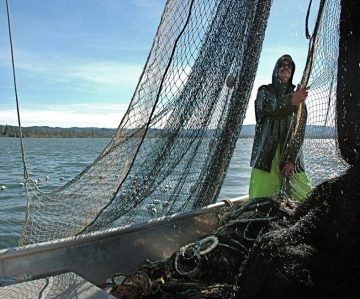 The Washington and Oregon fish and wildlife commissions will decide in the next two months whether to implement fully in 2017 the biggest overhaul of Columbia River salmon policies in seven decades. Reforms adopted by both states in early 2013 allocated more chinook salmon to sportsmen in the main Columbia and restricted gillnetting to off-channel sites like Youngs Bay near Astoria. The reforms also called for commercial fishing that remained in the main Columbia to be done with live-capture methods — such as purse seines and beach seines — designed to harvest hatchery stocks and release wild fish. The reforms had a four-year transition period, which ends Dec. 31. Full implementation was to begin on Jan. 1. But, there have been issues during the 2013-2016 transition period. The effort to stock more chinook and coho in off-channel spots, and development of new off-channel places, has met with some success, but failures, too. Testing of beach and purse seines in the main Columbia have found much higher mortality rates of released fish than anticipated four years ago. Read the rest here 12:38
The Washington and Oregon fish and wildlife commissions will decide in the next two months whether to implement fully in 2017 the biggest overhaul of Columbia River salmon policies in seven decades. Reforms adopted by both states in early 2013 allocated more chinook salmon to sportsmen in the main Columbia and restricted gillnetting to off-channel sites like Youngs Bay near Astoria. The reforms also called for commercial fishing that remained in the main Columbia to be done with live-capture methods — such as purse seines and beach seines — designed to harvest hatchery stocks and release wild fish. The reforms had a four-year transition period, which ends Dec. 31. Full implementation was to begin on Jan. 1. But, there have been issues during the 2013-2016 transition period. The effort to stock more chinook and coho in off-channel spots, and development of new off-channel places, has met with some success, but failures, too. Testing of beach and purse seines in the main Columbia have found much higher mortality rates of released fish than anticipated four years ago. Read the rest here 12:38
Washington Fish and Wildlife Commission discusses salmon fishing reforms
 Washington’s Fish and Wildlife Commission was briefed Saturday on the Columbia River salmon reforms, but took no action. Kyle Adicks of the state Department of Fish and Wildlife told the commission that studies have shown beach seines and purse seines have a higher mortality rate on released salmon than anticipated, complicating intentions to use them to replace gillnets.A new study of salmon and steelhead release mortality has been designed and the state is looking for money to pay for the research. “One of the issues if we do implement that study and mortality rates are lower than expected we still have the previous studies that TAC (Columbia River Technical Advisory Committee) and NOAA (National Oceanic and Atmospheric Administration) might not just want to put aside,’’ Adicks said. “They’ll want to consider all the information.’’ Read the rest here 15:58
Washington’s Fish and Wildlife Commission was briefed Saturday on the Columbia River salmon reforms, but took no action. Kyle Adicks of the state Department of Fish and Wildlife told the commission that studies have shown beach seines and purse seines have a higher mortality rate on released salmon than anticipated, complicating intentions to use them to replace gillnets.A new study of salmon and steelhead release mortality has been designed and the state is looking for money to pay for the research. “One of the issues if we do implement that study and mortality rates are lower than expected we still have the previous studies that TAC (Columbia River Technical Advisory Committee) and NOAA (National Oceanic and Atmospheric Administration) might not just want to put aside,’’ Adicks said. “They’ll want to consider all the information.’’ Read the rest here 15:58
Commission to get briefed on Columbia River salmon fishing reforms
 State fisheries officials will brief the Washington Fish and Wildlife Commission here Saturday on the results of the 2013-2016 transition period of the Columbia River salmon management reforms and ask for guidance heading into 2017. In late 2012 and early 2013, the Washington and Oregon commissions adopted the biggest overhaul of Columbia River salmon policies in decades. Jumpstarted by former Oregon Gov. John Kitzhaber, the policies called for allocating more chinook salmon to sportsmen in the main Columbia and restricting gillnetting to off-channel sites like Youngs Bay near Astoria. Read the rest here 10:41
State fisheries officials will brief the Washington Fish and Wildlife Commission here Saturday on the results of the 2013-2016 transition period of the Columbia River salmon management reforms and ask for guidance heading into 2017. In late 2012 and early 2013, the Washington and Oregon commissions adopted the biggest overhaul of Columbia River salmon policies in decades. Jumpstarted by former Oregon Gov. John Kitzhaber, the policies called for allocating more chinook salmon to sportsmen in the main Columbia and restricting gillnetting to off-channel sites like Youngs Bay near Astoria. Read the rest here 10:41
Sportsmen, commercial fishermen disagree over Columbia River reforms
 Three years ago, Washington and Oregon adopted the most sweeping reforms of lower Columbia River sport and commercial fishing policies since the 1930s. Saturday, in Vancouver, the Washington Fish and Wildlife Commission was told: By sportsmen, that the reforms are working and eventually the Columbia can be a world-class fishery rivaling Alaska. By gillnetters, that the reforms have serious flaws, promises made to the commercial fishing industry are not being met, and revisions are needed. Read the article here 21:18
Three years ago, Washington and Oregon adopted the most sweeping reforms of lower Columbia River sport and commercial fishing policies since the 1930s. Saturday, in Vancouver, the Washington Fish and Wildlife Commission was told: By sportsmen, that the reforms are working and eventually the Columbia can be a world-class fishery rivaling Alaska. By gillnetters, that the reforms have serious flaws, promises made to the commercial fishing industry are not being met, and revisions are needed. Read the article here 21:18
Willapa Bay plan cuts Chinook production by one-third
 The production of hatchery Chinook in Willapa Bay will decrease by more than one-third as a result of a policy adopted recently by the Washington Fish and Wildlife Commission. The policy, adopted in June, also is likely to decrease the number of fish commercial fishermen can catch if the commission’s action survives a legal challenge. Washington Department of Fish and Wildlife officials have said that they needed to adopt the new policy to avoid having the Chinook listed under the federal Endangered Species Act. Read the rest here 10:14
The production of hatchery Chinook in Willapa Bay will decrease by more than one-third as a result of a policy adopted recently by the Washington Fish and Wildlife Commission. The policy, adopted in June, also is likely to decrease the number of fish commercial fishermen can catch if the commission’s action survives a legal challenge. Washington Department of Fish and Wildlife officials have said that they needed to adopt the new policy to avoid having the Chinook listed under the federal Endangered Species Act. Read the rest here 10:14
Willapa worries: Fishermen protest salmon-harvest cutback in bay
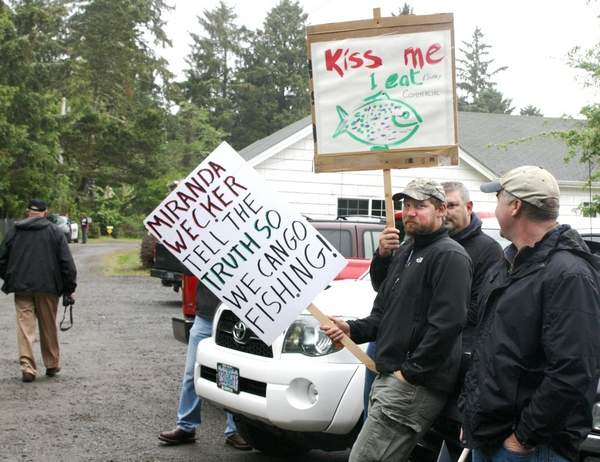 More than 30 commercial fishermen and seafood processors picketed outside the annual Pacific County Marine Resource Committee Science Conference at the Cranberry Museum in Long Beach May 16, protesting a draft management policy they say could end commercial salmon fishing on Willapa Bay. The woman they believe is behind the policy, former Washington Fish and Wildlife Commission member Miranda Wecker, spoke at the conference, talking about lessons she’s learned working with state agencies in Willapa Bay over the past 23 years. Read the rest here 15:17
More than 30 commercial fishermen and seafood processors picketed outside the annual Pacific County Marine Resource Committee Science Conference at the Cranberry Museum in Long Beach May 16, protesting a draft management policy they say could end commercial salmon fishing on Willapa Bay. The woman they believe is behind the policy, former Washington Fish and Wildlife Commission member Miranda Wecker, spoke at the conference, talking about lessons she’s learned working with state agencies in Willapa Bay over the past 23 years. Read the rest here 15:17
Washington Fish and Wildlife Commission opts to curtail receational, commercial fishing for smelt in Puget Sound
 The state will curtail recreational and commercial smelt fishing in Puget Sound in hopes of increasing protection for the species. The commission also considered two other options: one making no change and the other closing commercial fishing and limiting recreational fishing. The commission also requested an annual review of the commercial and recreational smelt fisheries in the Sound. Read more here 17:06
The state will curtail recreational and commercial smelt fishing in Puget Sound in hopes of increasing protection for the species. The commission also considered two other options: one making no change and the other closing commercial fishing and limiting recreational fishing. The commission also requested an annual review of the commercial and recreational smelt fisheries in the Sound. Read more here 17:06
Washington Fish and Wildlife Commission to consider changing smelt fishing regulations
OLYMPIA – The Washington Fish and Wildlife Commission will consider proposed changes to recreational and commercial smelt fishing regulations in Puget Sound during a public meeting June 13-14 in Olympia. Read more here 12:55
Gov. Jay Inslee reappoints Wecker to Fish and Wildlife Commission, also appoints commercial fishing proponent
The current chairwoman of the state Fish and Wildlife Commission has been reappointed, while the executive director of the Purse Seine Vessel Owners Association has been named to fill a vacant position. continued@thenewstribune
Fishing Regulations Force Market Vendors to Sell Alaskan Salmon – the demise of commercial fishing
![]() “It’s being portrayed by some as the demise of commercial fishing in the Columbia and that was not the intent, it’s not what is built into our plan, and it is not what the economic analysis that both [Oregon and Washington] did showed,” says commission chairwoman Miranda Wecker. “Our economic analysis showed that the commercial fishery should do better.” But the gillnetters are royally pissed off and calling the commission’s bluff. The Puget Sound Salmon Commission, made up of commercial gillnetters, conducted a separate study showing gillnets have a lower bycatch than purse seines. They’re skeptical these future fish will ever exist and claim the commission has motives other than fish protection. continued
“It’s being portrayed by some as the demise of commercial fishing in the Columbia and that was not the intent, it’s not what is built into our plan, and it is not what the economic analysis that both [Oregon and Washington] did showed,” says commission chairwoman Miranda Wecker. “Our economic analysis showed that the commercial fishery should do better.” But the gillnetters are royally pissed off and calling the commission’s bluff. The Puget Sound Salmon Commission, made up of commercial gillnetters, conducted a separate study showing gillnets have a lower bycatch than purse seines. They’re skeptical these future fish will ever exist and claim the commission has motives other than fish protection. continued
How today’s gillnet policy grounded Skamakowa’s Marty Kuller
SKAMOKAWA — When Marty Kuller was growing up in Seward, Alaska, commercial fishermen walked tall, and little boys like Kuller looked up to them. “Growing up as a young man, the commercial fishermen were the pillars of the community. As a young man, that was my dream. You know how something like that can take hold in you,” Kuller, 50, said last week. But these days, gillnetting no longer fills his heart with pride and excitement. Read more
something like that can take hold in you,” Kuller, 50, said last week. But these days, gillnetting no longer fills his heart with pride and excitement. Read more

































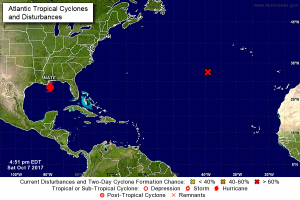
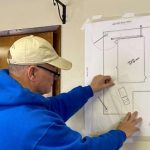
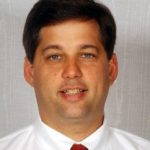
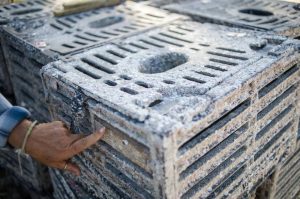

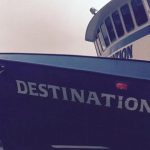
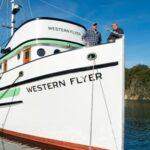
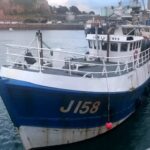

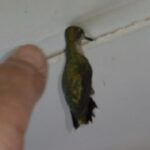
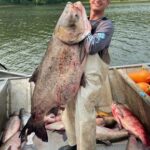




WDFW invites public comments on fishery restructuring
OLYMPIA, Wash. — The Washington Fish and Wildlife Commission invites public comments on plans to restructure salmon and sturgeon fisheries on the lower Columbia River at a public meeting scheduled for Nov. 8 and 9 in Room 172 of the Natural Resources Building, 1111 Washington St. S.E., in Olympia, Wash. An agenda for the meeting is available at http://goo.gl/HtqhI
http://wdfw.wa.gov/commission/meetings.html
Share this post